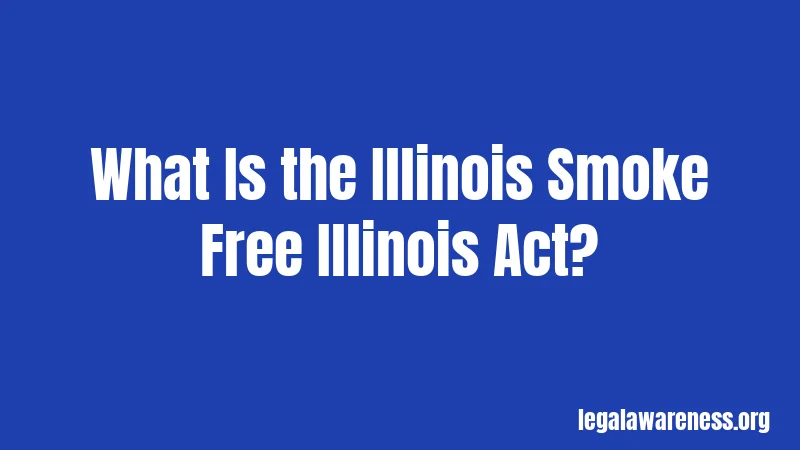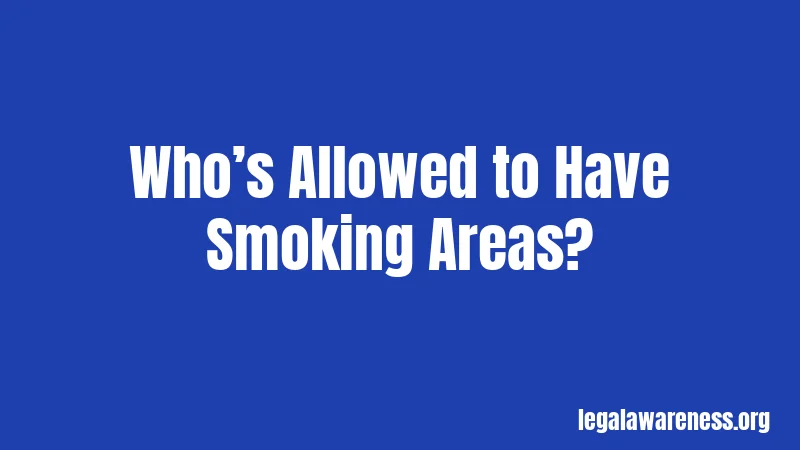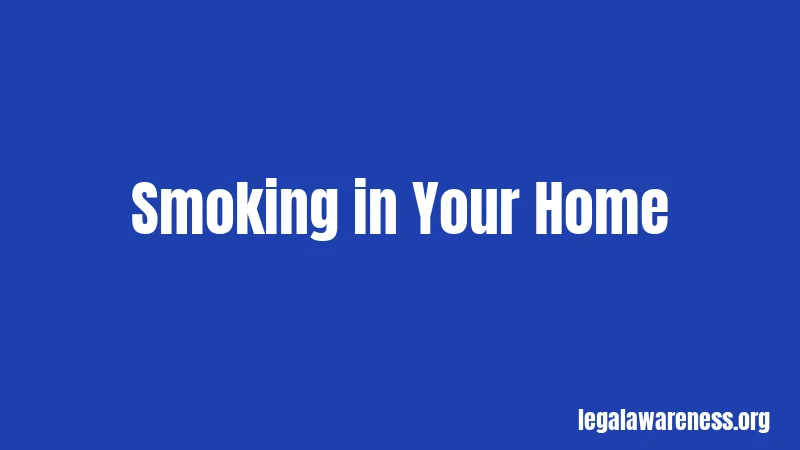Illinois Smoking Laws (2026): What’s Banned and What You Should Know
Most people don’t realize how strict Illinois smoking laws actually are. Seriously. You could be breaking the law without even knowing it. Let’s break down exactly what you need to know about smoking in Illinois and the penalties that come with it.
Illinois has some of the toughest smoking restrictions in the country. The state cares a lot about protecting people from secondhand smoke. That means rules apply almost everywhere you go. Understanding these rules keeps you out of trouble and protects your health too.
What Is the Illinois Smoke Free Illinois Act?

The Illinois Smoke Free Illinois Act is the main law that controls smoking across the state. It basically says you can’t smoke in most indoor public places. That includes restaurants, bars, offices, and lots of other locations. The law passed in 2008 and has been strengthened since then.
Think of it like a traffic rule for smoking. Just like you can’t drive however you want, you can’t smoke wherever you want in Illinois. The law sets clear boundaries about where smoking is and isn’t allowed.
Basic Smoking Laws in Illinois
Where You Can’t Smoke Indoors
You can’t smoke inside most buildings in Illinois. Pretty much any public place is off-limits. That includes restaurants and bars. Offices, hospitals, and schools are banned too. Even some private workplaces have smoking restrictions.
Wondering what else is covered? Indoor shopping malls are smoke-free. Theaters and entertainment venues don’t allow smoking. Most apartment buildings restrict smoking indoors as well. Even some casinos and gaming establishments have restrictions.
Public Transportation and Vehicles
This one’s important. You can’t smoke on any public transportation in Illinois. That means buses, trains, and rides like Uber or Lyft. Stay with me here because there’s more. Smoking is also banned in any vehicle where a minor is present. Yes, even in your own car. If there’s a child under 18 in the vehicle, smoking is illegal.
Workplaces
Illinois has strict workplace smoking rules. Your employer must keep workplaces smoke-free. This applies to both indoor and outdoor areas in many cases. Employees have the right to a smoke-free workspace. Employers who don’t enforce this can face penalties.
Outdoor Areas
Okay, pause. Read this carefully. Outdoor smoking bans are expanding in Illinois. Most cities and towns now ban smoking in public parks. Beaches and recreational areas are usually smoke-free. Some municipalities even restrict smoking near school buildings and playgrounds.
Not sure if your city has these rules? Check your local ordinances. Many Illinois cities are stricter than the state law. Chicago, for example, has additional outdoor smoking restrictions. It’s worth looking up what applies where you live.
Who’s Allowed to Have Smoking Areas?

Some workplaces can have designated smoking areas. But here’s the catch. These areas must be completely separated from non-smoking areas. They need proper ventilation and separate entrances. The smoking area can’t share air with other parts of the building.
Basically, it’s pretty hard to create a legal smoking area. Most employers find it easier to ban smoking completely. That’s why you see smoke-free workplaces everywhere in Illinois now.
Penalties for Breaking Smoking Laws
First Violation
Let’s talk about what happens if you break these laws. For a first offense, you could face a fine up to $100. That’s just the starting point though. Different locations might have different penalties. Some cities impose higher fines than the state minimum.
Repeat Violations
Getting caught again? Second violations can cost you up to $250. Third and subsequent violations? You’re looking at up to $500. These fines add up quick. Plus, you might face other consequences too.
Business Penalties
This part can be tricky, honestly. If you own a business that violates smoking laws, penalties are much higher. First violations can cost $500. Second violations jump to $1,000. Repeated violations can get even worse.
Honestly, this is the part most business owners miss. Some violations can lead to license suspension or revocation. A restaurant could lose its operating license. A bar might face serious consequences. These aren’t just small fines. They can threaten your entire business.
Smoking in Your Home

Good news on this one. You can smoke in your own home. Illinois law doesn’t restrict smoking in private residences. That means you can smoke inside your house without breaking state law.
But wait, there’s more to know. If you live in an apartment or condo, your lease might ban smoking. Your landlord can set stricter rules than the state. Many residential buildings prohibit indoor smoking now. So check your lease before lighting up.
Secondhand smoke seeping into neighbors’ units is actually a legal issue. If your smoke travels to someone else’s apartment, you could face problems. Some leases specifically address this. Others don’t. Either way, it’s worth being aware.
E-Cigarettes and Vaping
You’re probably wondering about vaping. E-cigarette laws in Illinois are basically the same as cigarette laws. You can’t vape in most places where you can’t smoke. That includes bars, restaurants, and workplaces. Public transportation bans vaping too.
Wait, it gets better. Some places are even stricter with e-cigarettes. Schools ban vaping completely, including on school grounds. Parks and recreational areas often restrict vaping. Youth can’t buy e-cigarettes in Illinois. The minimum age is 21. Being under 21 and using e-cigarettes can get you a ticket.
Marijuana Smoking Laws
Illinois legalized marijuana for adults, but that doesn’t mean you can smoke it anywhere. You can’t smoke marijuana in most of the same places you can’t smoke cigarettes. No smoking in public places. No smoking in workplaces. No smoking on public transportation.
One big difference is important though. You can smoke marijuana in your home privately. You can also use it in licensed social consumption lounges. These are special venues licensed by the state. Regular bars and restaurants can’t allow it. Basically, marijuana has more restrictions than cigarettes in public spaces.
How to Report Illegal Smoking
Think you’ve spotted a violation? You can report it. Most cities have a public health or business licensing department. Chicago residents can call 311 to report violations. Other cities have their own reporting systems.
Here’s what you should do. Document the location and time. Note what business or area had the violation. Get details about what you saw. When you report it, be specific. That helps investigators follow up properly.
What Happens After You Report?
Authorities will investigate your complaint. They might visit the location. If they find a violation, they’ll issue a citation. The property owner or manager will face penalties. Your identity is usually kept private. You’re protecting public health when you report.
Special Cases and Exceptions
Gaming Establishments
Some casinos and gaming venues have special rules. Illinois allows more leniency in certain gaming areas. However, this varies by location and license type. Even gaming establishments must provide smoke-free areas. Staff areas especially must be protected.
Designated Smoking Rooms
Certain hotels and motels can have designated smoking rooms. These rooms must follow specific standards. They need separate ventilation systems. Doors must close automatically. These standards are strict because of the enclosed space risk.
Healthcare Facilities
Hospitals and medical offices are completely smoke-free. This includes all indoor and outdoor areas on hospital grounds. No exceptions exist here. Patient safety is the priority. Healthcare workers have strong protections under this rule.
Recent Changes to Illinois Smoking Laws
The good news? Illinois smoking laws haven’t changed dramatically recently. However, individual cities keep updating their rules. Chicago strengthened its outdoor smoking restrictions. More communities are banning smoking in parks and beaches. These local changes happen regularly.
I looked this up recently. The trend is definitely toward stricter rules. More cities are adopting outdoor bans. Schools are expanding their smoke-free zones. If you’re planning to visit or move to Illinois, expect smoking to be prohibited in most places. Better to assume something is off-limits than get caught by surprise.
Steps to Comply with Smoking Laws
If You’re a Smoker
Okay, here’s what you need to do. Know where smoking is allowed in your area. Ask before lighting up in unfamiliar places. Follow all workplace policies. If you work somewhere with smoking restrictions, respect them. Many employers provide smoking cessation programs. Use them if you’re interested in quitting.
If You Own a Business
Trust me, this matters. Post clear no-smoking signs everywhere. Train your staff on smoking policies. Have a plan for enforcement. Make sure outdoor areas comply with local rules. Keep your smoking areas properly maintained if you have them. Stay updated on law changes. Your city might tighten rules.
If You Work Somewhere
Make sure your workplace is actually compliant. If you think your employer is breaking the law, speak up. Document violations. Report them to your health department if needed. You have the right to a smoke-free workspace under Illinois law.
Frequently Asked Questions
Can I smoke on my apartment balcony? It depends on your lease and local rules. Your landlord can ban balcony smoking. Some cities restrict it too. Check your lease first. Then check your city’s ordinances.
What about smoking in my car with just adults? You’re legally allowed to do this. The restriction only applies when minors are present. However, if you’re parked in a no-smoking area, different rules might apply.
Are there any places in Illinois where smoking is still allowed inside? Very few. Private homes are the main exception. Some designated hotel rooms might allow it. Gaming venues have limited exceptions. That’s basically it though.
Can I get in trouble for secondhand smoke in my apartment? Yes, potentially. If your smoke enters a neighbor’s unit, you could violate their right to a smoke-free home. Your lease might specifically address this. Neighbors can take legal action in some cases.
What’s the punishment for a minor caught smoking? Minors can receive fines and citations. First violations might result in community service. Repeated violations can lead to higher penalties. Programs exist to help young people quit. Courts often require participation in these programs.
Final Thoughts
Now you know the basics about Illinois smoking laws. They’re strict, but they exist for good reasons. Secondhand smoke is dangerous. These laws protect everyone’s health. Stay informed about your local rules since they might be stricter than state law. When in doubt, ask someone or look it up online. Keep yourself and others safe by following these rules. You’ve got this.
References
Illinois Health Code: Smoke Free Illinois Act
Illinois General Assembly: Public Act 95-0017
City of Chicago: Smoking Ordinance Information
